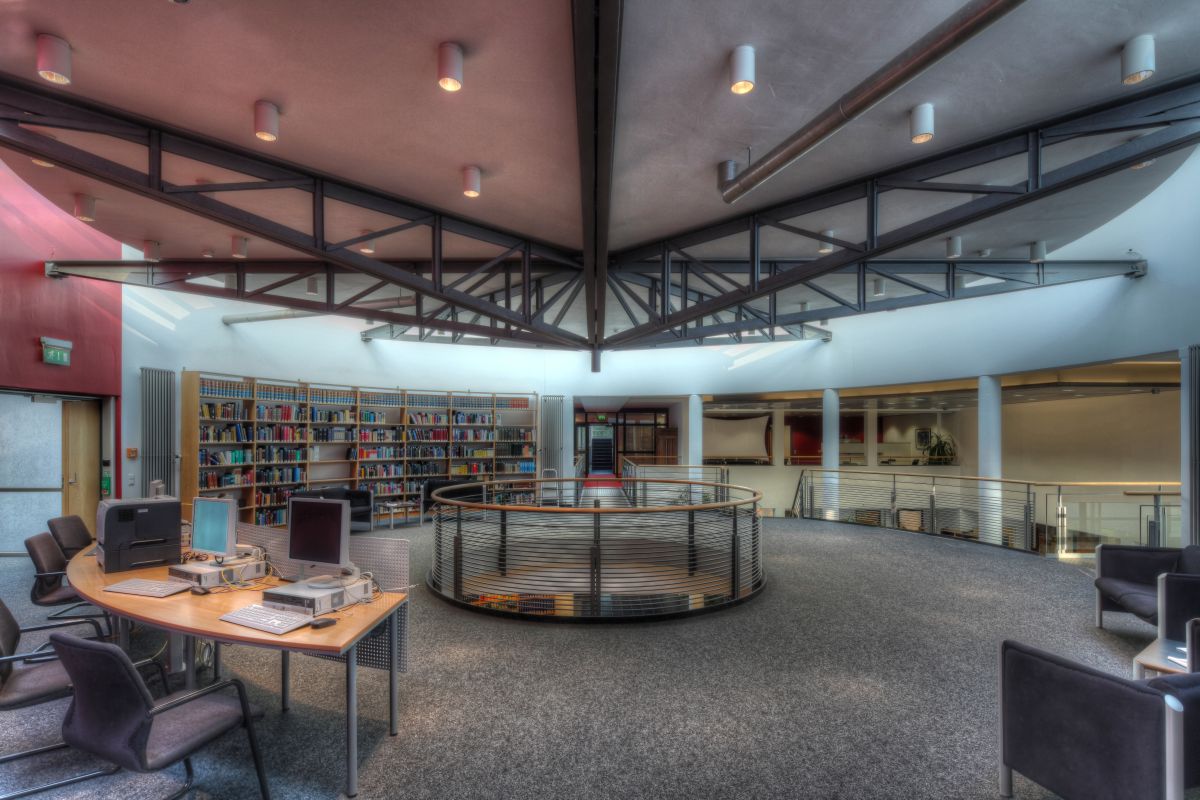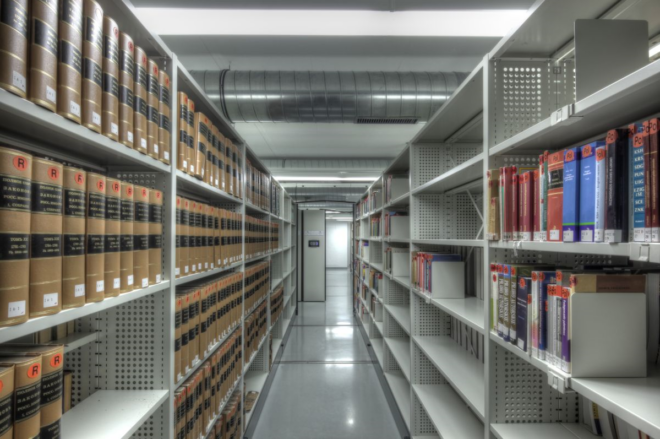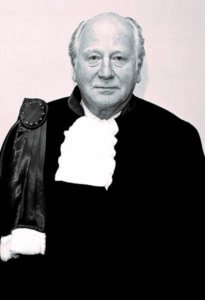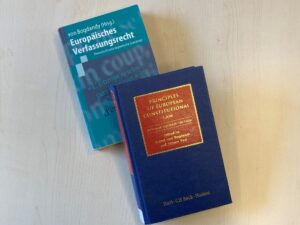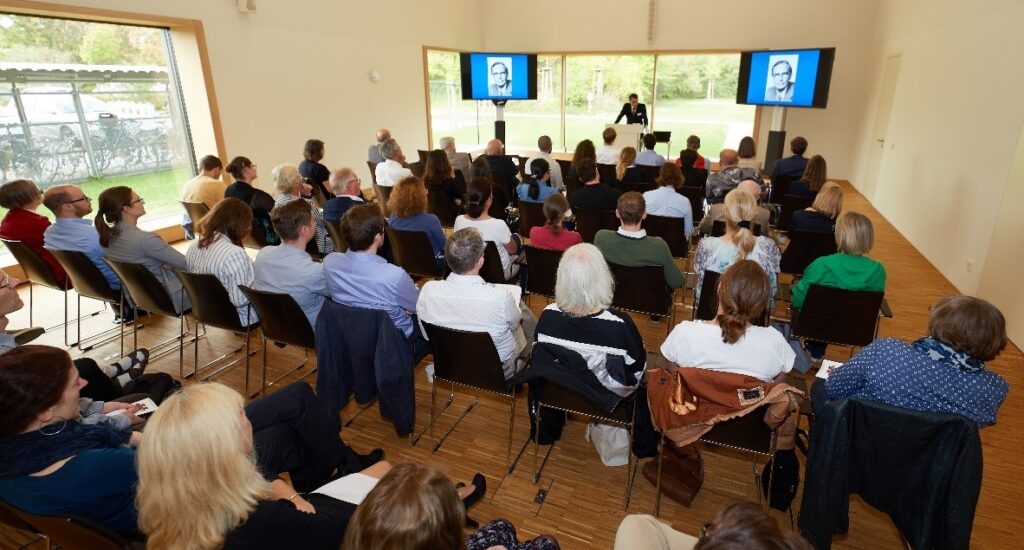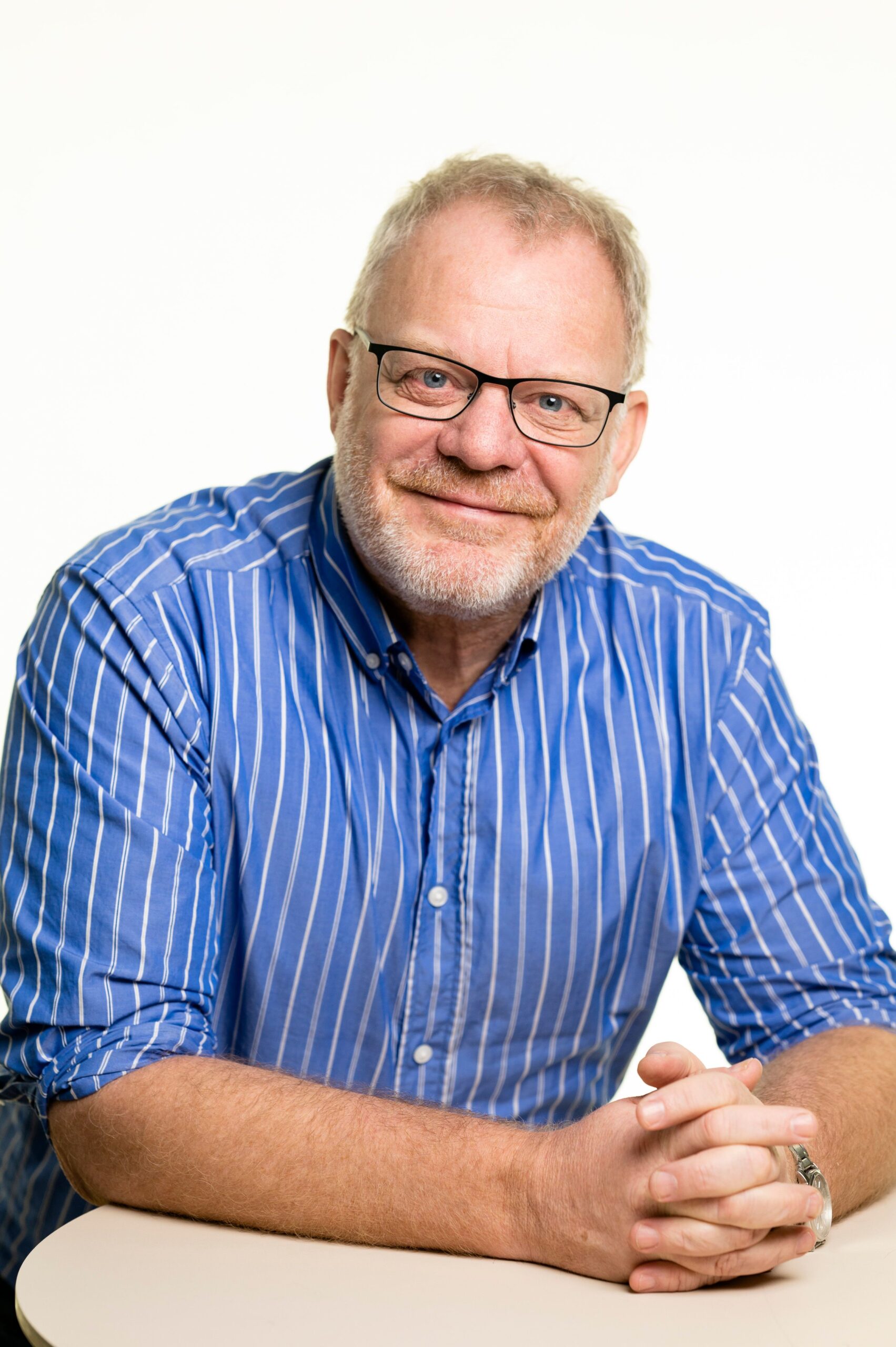Das Institutsgebäude um 2010 (Foto: MPIL)
Deutsch
Constance Grewe über ein ungewöhnliches Jahr in Heidelberg (2010-2011)
Im Gegensatz zu vielen Gästen kam ich nicht als junge Forscherin, sondern am Ende meiner Universitätslaufbahn in Frankreich (Chambéry, Caen, Straßburg) nach Heidelberg zum Max-Planck-Institut für ausländisches öffentliches Recht und Völkerrecht (MPIL). 2007 war mir der Forschungspreis der Humboldt Stiftung verliehen worden, mit dem ein längerer Forschungsaufenthalt in Deutschland verbunden war. Das kam mir sehr gelegen, denn für meine verfassungsvergleichenden Forschungen waren deutsche Bibliotheken besonders gut ausgestattet. So war ich zunächst einen Monat in Bielefeld und habe mich dann 2010 bei der Universität Straßburg, wo ich Professorin für öffentliches Recht war, für eine sogenannte „Forschungsdelegation“ beworben. Eine Forschungsdelegation bietet die Möglichkeit, seine Forschung für eine begrenzte Zeit in einer anderen Institution zu betreiben und während dieser Periode (hier ein Jahr) von den Lehrverpflichtungen freigestellt zu werden. Ich hatte meinen Antrag damit begründet, dass ich den von dem Humboldt Preis vorgesehenen Forschungsaufenthalt in Deutschland noch nicht vollendet hatte und dass der für meine Forschungsprojekte geeignetste Platz das MPIL zu sein schien. Diese Delegation konkretisierte sich dann in einem Vertrag zwischen der Universität Straßburg und dem Institut und so kam ich im September 2010 nach Heidelberg, wo ich bis zum Ende des Jahres 2011 blieb.
Von Frankreich zurück nach Deutschland. Erste Schritte in der alten Heimat
Es war eine etwas merkwürdige Situation, denn ich kam als Ausländerin. Nachdem ich meine ganze Karriere in Frankreich absolviert und auch die französische Staatsangehörigkeit erhalten hatte, kehrte ich nun für eine gewisse Zeit in mein Heimatland zurück, denn meine Kindheit habe ich bis zum Beginn meines juristischen Studiums in Deutschland verbracht und auch meine Eltern waren deutsch. Diese besondere Konstellation mag Ursache dafür sein, dass das Buddy-System, das damals noch neu im Institut war und ausländischen Gästen die ersten praktischen Schritte erleichtern sollte, für mich wenig funktionierte. Ich musste also allein die diversen praktischen Probleme lösen, so zum Beispiel ein Konto öffnen, was normalerweise ein in Deutschland bezogenes Gehalt erforderte, und eine Wohnung finden, was ohne deutsches Konto unmöglich erschien. Zum Glück habe ich andere in Heidelberg lebende Ausländer kennengelernt, die mir dabei weiterhalfen. Auch das hat die Eigentümlichkeit der Situation als Ausländerin im Heimatland unterstrichen.
Im Institut wurde ich mit einem schönen Arbeitszimmer mit Blick auf die Berge verwöhnt. Es lag direkt neben demjenigen von Herrn Frowein, mit dem ich auf diese Weise das Vergnügen mancher Begegnungen hatte. Auch von der Bibliothek fühlte ich mich verwöhnt: Die Ausleihe war höchst effizient, vor allem aber habe ich den freundlichen, ja herzlichen Umgang mit Sandra Berg und Ali Zakouri geschätzt. Insgesamt waren die Beziehungen mit den Mitarbeiterinnen und Mitarbeitern des Instituts sehr angenehm. Die Montagsrunde, zu der Zeit noch Referentenbesprechung genannt, besuchte ich mit Interesse und Neugier, sowohl was die Themen anlangte als auch die Person der Vortragenden. So habe ich spannende Diskussionen mit anderen Gästen aus vielen Ländern und Mitarbeitern des Instituts führen können, die sich teilweise beim Mittwochstee der Gäste oder im benachbarten Restaurant „Olive“ fortsetzten. Zu dieser Zeit waren kaum französische Gäste am MPIL und ich suchte auch vor allem den Kontakt zu mittel- und osteuropäischen Gästen oder auf diesem Gebiet spezialisierten Mitarbeitern, da ich vor allem meine Kenntnisse im Verfassungsrecht von Mittel-, Ost- und Südosteuropa erweitern und vertiefen wollte. Ein wichtiger Anlass dafür war mein Richteramt am Verfassungsgericht in Bosnien‑Herzegowina, in dem bis heute gemäß dem Abkommen von Dayton drei ausländische Richter sitzen.
Einen tieferen Einblick in das Leben des Instituts gewann ich durch meine Mitgliedschaft im Fachbeirat, in den ich 2003 berufen wurde. Als besonders anregend empfand ich dabei vor allem die Berichte der verschiedenen Forschungsgruppen und Stipendiaten. Sie vermittelten ein anschauliches Bild der Vielfalt und Intensität der Forschung am Institut. Was die Evaluierung der diversen Aktivitäten anlangte, so hatte ich auf diesem Gebiet bereits eine gewisse Erfahrung, da ich schon früher an französischen Universitäten und in Österreich an Evaluierungen beteiligt gewesen war und solche auch selbst als Direktorin einer Forschungsgruppe in Straßburg erlebt hatte. Dennoch erschien mir dieser Vorgang am Institut besonders kompliziert wegen der so zahlreichen und sehr unterschiedlichen Akteure. Es ist also nicht verwunderlich, dass die Evaluierung jeweils intensive Diskussionen und Besprechungen der Fachbeiratsmitglieder auslöste.
Ein undurchführbares Forschungsprojekt und seine positive Wendung
Für meine eigene Forschung war die Zeit in Heidelberg natürlich ebenfalls wichtig. Im Zusammenhang mit meiner Funktion als internationale Richterin am Verfassungsgericht von Bosnien‑Herzegowina kam ich zunächst ins Gespräch mit Michael Riegner, der sich im Kosovo aufgehalten und mit dem dortigen Verfassungsgericht Kontakt aufgenommen hatte. Daraus hat sich ein gemeinsames Projekt ergeben, nämlich ein Vergleich beider Länder unter dem Aspekt der Internationalisierung von Verfassungen in gespaltenen Gesellschaften und der Frage, inwieweit die durch die Internationalisierung bedingten Abweichungen vom klassischen nationalen Konstitutionalismus einer Demokratisierung entgegenstehen. Unser Aufenthalt im Institut hat uns die Chance gegeben, diesen Artikel im Max Planck Yearbook of United Nations Law veröffentlichen zu können.
Sodann hat mich Anne Peters gebeten, ein Referat im Rahmen des Gesprächskreises Europäisches Verfassungsrecht vor der Staatsrechtslehrertagung 2011 zu halten. Es ging um den Beitritt der EU zur EMRK mit der Frage, inwieweit dies eine wirksame Durchsetzung einer gesamteuropäischen Grundrechteverfassung bedeuten könne. Zur Vorbereitung des Referats hat mir Armin von Bogdandy freundlicherweise angeboten, in seinem Forschungsseminar darüber zu referieren und zu diskutieren. Der Beitrag wurde in der Zeitschrift Europarecht publiziert.
Es wurde mir jedoch zunehmend klar, dass ich mein eigentliches Forschungsprojekt – eine neue Auflage des Buchs über vergleichendes Verfassungsrecht in Europa – nicht verwirklichen könne. In der Zwischenzeit – die erste Auflage stammte aus dem Jahr 1995 – waren nämlich einerseits zehn hauptsächlich mittel- und osteuropäische Länder in die EU aufgenommen worden, was die Zahl der zu vergleichenden Rechtsordnungen erheblich erhöhte. Andererseits hatten sich die rechtlichen Beziehungen zwischen der EU und den Mitgliedstaaten im Wege der Vertragsänderungen und der wachsenden Rechtsprechung so geändert, dass es unmöglich oder jedenfalls unrealistisch erschien, das Verfassungsrecht isoliert zu betrachten. Daher konzentrierte sich mein Interesse immer mehr auf das Konzept eines europäischen Rechtsraums, was jedoch gleichzeitig zu der Einsicht führte, dass mein Projekt nur durch ein Team, welches mir nicht zur Verfügung stand, zu bewerkstelligen war.
Doch wie die meisten negativ anmutenden Erlebnisse hatte auch dieses seine positiven Seiten: die Gespräche mit Armin von Bogdandy über Komplexität von Begriff und Inhalt eines europäischen Verfassungsrechts führten zu dem Angebot, für den Band VII des Handbuchs Jus Publicum Europaeum einen Beitrag über die Verfassungsgerichtsbarkeit in den post-jugoslawischen Ländern zu schreiben, und zwar in der Perspektive des europäischen Rechtsraums. Es handelte sich also zunächst darum, meine Erfahrungen am bosnischen Gericht für die Erforschung der Rechtsordnungen und insbesondere der Verfassungsgerichtsbarkeit in den anderen postjugoslawischen Ländern (Slowenien, Kroatien, Serbien, Nordmazedonien, Montenegro und Kosovo) fruchtbar zu machen. Dabei war es interessant, sowohl die Vielfältigkeit der Unterschiede als auch das gemeinsame geschichtliche Erbe zu verdeutlichen. Sodann verfolgte die Studie das Ziel, anhand einer Umschreibung des europäischen Rechtsraums die mehr oder weniger große Annäherung der postjugoslawischen Rechtskulturen zu diesem europäischen Rechtsraum zu erfassen. Dabei ist mir oft der Kontrast zwischen recht progressiven Texten und deren mangelnder Durchsetzung aufgefallen.
Hat diese Arbeit auch viel Zeit und Mühe gekostet, nicht zuletzt, weil meine Deutschsprachigkeit etwas „eingerostet“ war, so habe ich doch viel dabei gelernt und auch viel Freude, vor allem in dem Austausch mit Christoph Krenn und der so konstruktiven und animierten Revision mit Karin Oellers‑Frahm gehabt. Schließlich war es auch dieser Artikel, der Armin von Bogdandy veranlasste, mich einer Abgeordneten im europäischen Parlament zu empfehlen, die sich wegen eines verfassungsrechtlichen Gutachtens über den Kosovo an ihn gewendet hatte. Dies fiel genau in die Zeit der Corona-Pandemie und den Lockdown in Frankreich, so dass ich äußerst dankbar war, an etwas anderes denken zu müssen.
Bei meinem Abschied aus Heidelberg hat mich Armin von Bogdandy gefragt, wie mir der Aufenthalt in Deutschland gefallen habe und was mir dabei besonders aufgefallen sei. In meiner Antwort betonte ich ganz besonders die Qualität der öffentlichen Debatten in Rundfunk und Fernsehen geschätzt zu haben, insbesondere die Fähigkeit, auf die Argumente anderer einzugehen. Dies fehlt meiner Ansicht nach in Frankreich, wo die meisten „Debatten“ in gekreuzte Monologe ausarten. Der Minuspunkt – das überrascht natürlich nicht von einem Frankreichbewohner – war das Einkaufen und Essen, was ich im Ganzen als monoton empfand.
Nach diesem längeren Forschungsaufenthalt im Institut kam ich zurück nach Straßburg und wurde dort pensioniert, während meine richterliche Tätigkeit noch bis Ende 2016 dauerte. Danach folgte dann die englische Version des Handbuchs, wobei mir die Hilfe von Laura Hering und Naomi Shulman sehr kostbar war. Schließlich bleibt der Kontakt mit dem Institut aufrecht erhalten durch die Alumni-Treffen, die mich jedes Mal mit ihren Vorträgen und den vielfältigen Gesprächen erfreuen.
|
Suggested Citation: Constance Grewe, Als „deutsche Ausländerin“ am MPIL. Constance Grewe über ein ungewöhnliches Jahr in Heidelberg (2010-2011), MPIL100.de, DOI: 10.17176/20240404-213408-0 |
|
| Lizenz: CC BY-NC-SA 4.0 DEED | |
Français
Récit d’une année hors du commun à Heidelberg (2010-2011) de Constance Grewe
Contrairement à bien des invités, je ne suis pas venue à l’Institut Max-Planck de Heidelberg en tant que jeune chercheuse mais à la fin de ma carrière universitaire en France (Chambéry, Caen, Strasbourg). En 2007, j’avais obtenu le prix Humboldt-Gay Lussac auquel est associé un séjour de recherche en Allemagne. Cela me convenait d’autant plus que certaines bibliothèques allemandes étaient particulièrement bien fournies pour mes recherches de droit constitutionnel comparé. Ainsi, ayant passé d’abord un mois à Bielefeld, j’ai sollicité ensuite auprès de l’Université de Strasbourg où j’occupais un poste de professeur de droit public une délégation de recherche. Une telle délégation permet d’effectuer sa recherche pendant un certain temps dans une autre institution tout en étant libéré des charges d’enseignement. J’avais motivé ma demande par le fait que je n’avais pas encore accompli l’intégralité de mon séjour de recherche en Allemagne et que l’endroit le plus propice pour mes recherches était sans doute l’Institut Max-Planck de droit public et international comparé (MPIL) à Heidelberg. Un contrat conclu entre l’Université de Strasbourg et l’Institut Max-Planck en 2010 est venu concrétiser cette délégation. C’est ainsi que je suis arrivée en septembre 2010 à Heidelberg où j’ai séjourné jusqu’à la fin de l’année 2011.
Le retour de France en Allemagne : les premiers pas dans le pays d’origine

Le hall d’entrée vers 2010 (photo : MPIL)
Ce fut une situation un peu bizarre, car je venais en tant qu’étrangère. Alors que j’avais passé toute mon enfance jusqu’au début de mes études juridiques en Allemagne et que mes parents étaient allemands, j’ai parcouru toute ma carrière professionnelle en France et obtenu la nationalité française. Et soudain, je revins pour un certain temps dans mon pays d’origine. Cette constellation particulière explique peut-être que le système « Buddy », introduit depuis peu à l’Institut afin de faciliter leurs premières démarches aux invités étrangers, ne fonctionnait pas bien pour moi. J’étais donc obligée de résoudre toute seule les divers problèmes d’ordre matériel, comme ouvrir un compte ce qui supposait pourtant de recevoir un salaire en Allemagne et de trouver un logement ce qui apparaissait impossible sans un compte en Allemagne. Heureusement j’ai connu d’autres étrangers vivant à Heidelberg qui m’ont aidé à trouver des solutions. Mais cela aussi a mis en lumière la curiosité de cette situation d’étrangère dans son pays d’origine.
A l’Institut, on m’a gâtée d’un beau bureau avec vue sur la montagne, situé directement à côté de celui de M. Frowein que j’ai ainsi eu le plaisir de rencontrer de temps en temps. L’utilisation de la bibliothèque était un vrai bonheur : non seulement les prêts fonctionnaient de manière très efficace mais j’ai surtout apprécié le contact aimable et même cordial avec Sandra Berg et Ali Zakouri. D’ailleurs, les relations avec l’ensemble du personnel de l’Institut étaient très agréables. J’assistais aux réunions du lundi avec intérêt et curiosité tant en ce qui concernait les thèmes abordés que les personnes qui exposaient. J’ai ainsi pu mener des discussions intenses avec des invités de nombreux pays et avec des collaborateurs de l’Institut lesquelles se prolongeaient parfois au thé du mercredi ou au restaurant « Olive » situé à proximité de l’Institut. A cette époque, l’Institut ne comptait que peu d’invités français et d’ailleurs je recherchais le contact surtout avec des personnes issues de ou spécialisées dans l’étude des pays d’Europe centrale ou orientale puisque mon objectif était de développer et d’approfondir mes connaissances du droit constitutionnel d’Europe centrale, orientale et du sud-est. Cet intérêt s’expliquait notamment par ma fonction juridictionnelle à la Cour constitutionnelle de Bosnie-Herzégovine dans laquelle, en vertu des accords de Dayton, siègent jusqu’à aujourd’hui trois juges internationaux.
J’ai eu l’occasion d’observer de plus près la vie intérieure de l’Institut grâce à mon appartenance au Conseil scientifique (Fachbeirat) auquel j’avais été nommée dès 2003. Image vivante de la diversité et de l’intensité des recherches, les rapports des différentes équipes de recherche et des titulaires de bourses me paraissaient particulièrement stimulants. Dans le domaine de l’évaluation de la recherche, j’avais déjà une certaine expérience, ayant participé auparavant à l’évaluation de plusieurs universités françaises et d’une université autrichienne et l’ayant subie moi-même lorsque je dirigeais une équipe de recherche à Strasbourg. Appliqué à l’Institut, ce processus m’apparaissait néanmoins comme particulièrement complexe en raison du nombre et de la diversité des acteurs et des actions. Il n’est donc pas surprenant que l’évaluation ait suscité dans chaque cas des discussions intensives et des délibérations approfondies au sein du conseil.
L’infaisabilité du projet de recherche et sa transformation
Le séjour à Heidelberg fut évidemment important également pour ma propre recherche. Ma fonction de juge international à la Cour constitutionnelle de Bosnie-Herzégovine m’a d’abord permis d’entamer un dialogue avec Michael Riegner qui avait séjourné au Kosovo et qui avait pu, à cette occasion, établir un contact avec la Cour constitutionnelle de ce pays. Il en est résulté un projet commun, à savoir une comparaison des deux pays sous l’aspect de l’internationalisation des constitutions dans des sociétés divisées. L’une des questions essentielles était de savoir si et dans quelle mesure les dérogations au constitutionnalisme classique national impliquées par l’internationalisation s’opposaient à la démocratisation. Notre présence à l’Institut nous a offert la chance de pouvoir publier cet article au Max-Planck Yearbook of United Nations Law.
Par ailleurs, Anne Peters m’a demandé de présenter un exposé lors du cercle « Droit constitutionnel européen » se réunissant avant le colloque des publicistes allemands (Staatsrechtslehrertagung) de 2011. Il s’agissait de l’adhésion de l’UE à la CEDH et plus précisément de savoir dans quelle mesure cette adhésion pouvait s’analyser en une mise en œuvre effective d’une constitution pan-européenne des droits fondamentaux. Dans l’optique de la préparation de cet exposé, Armin von Bogdandy eut la gentillesse de me proposer d’en débattre au sein de son séminaire de recherche. La contribution a été publiée dans la revue Europarecht.
Cependant, il s’avérait de plus en plus clairement que je ne pourrai réaliser mon véritable projet de recherche, c’est-à-dire une nouvelle édition du livre sur le droit constitutionnel comparé en Europe. Depuis sa première édition en 1995, dix Etats, principalement d’Europe centrale et orientale, ont été admis dans l’UE, ce qui augmentait sensiblement le nombre d’ordres juridiques à comparer. En outre, du fait des modifications des traités et de l’accroissement considérable de la jurisprudence européenne, les rapports juridiques entre l’Union et ses Etats membres ont évolué au point qu’il paraissait impossible ou du moins irréaliste d’envisager le droit constitutionnel de manière isolée. C’est pourquoi mon intérêt s’est porté de plus en plus vers le concept d’un espace juridique européen. En même temps, je prenais conscience que mon projet ne pouvait être mis en œuvre que par une équipe de chercheurs dont je ne disposais pas.
Toutefois, comme la plupart des expériences apparemment négatives, celle-ci avait elle aussi ses côtés positifs : les conversations avec Armin von Bogdandy sur la complexité de la notion et le contenu d’un droit constitutionnel européen ont débouché sur la proposition de contribuer au volume VII du traité Jus Publicum Europaeum. Il s’agissait de traiter de la justice constitutionnelle dans les Etats post-yougoslaves dans la perspective d’un espace constitutionnel européen. Je devais donc d’abord, sur la base de mes expériences à la Cour bosnienne, appréhender les ordres juridiques – et la justice constitutionnelle en particulier – dans les autres pays post-yougoslaves (Slovénie, Croatie, Serbie, Macédoine du Nord, Monténégro et Kosovo). Il importait notamment de faire ressortir à la fois le nombre de différences et l’héritage historique commun. L’étude poursuivait ensuite l’objectif de caractériser davantage l’espace constitutionnel européen et d’évaluer le rapprochement plus ou moins important des cultures juridiques post-yougoslaves à cet espace. Ce qui m’a souvent frappé, à cet égard, était le contraste entre des textes assez progressifs et leur insuffisante mise en œuvre.
Si cette étude m’a demandé beaucoup de temps et d’efforts, ne serait-ce que parce que ma maîtrise de la langue allemande était un peu « rouillée », elle m’a néanmoins beaucoup appris. Ce sont cependant surtout les échanges avec Christoph Krenn ainsi que la révision si constructive et animée du texte avec Karin Oellers‑Frahm qui m’ont procuré un grand plaisir. C’est aussi cet article qui a conduit Armin von Bogdandy à me recommander auprès d’une députée du Parlement européen qui s’était adressée à lui pour un avis de droit constitutionnel sur le Kosovo. Cette demande tombait exactement au moment de la pandémie du Covid 19 et le confinement en France, si bien que j’ai été très reconnaissante de devoir penser à autre chose.
A mon départ de Heidelberg, Armin von Bogdandy m’a demandé ce que j’avais pensé de mon séjour et ce qui m’avait le plus frappée. Dans ma réponse, j’ai insisté sur la qualité du débat public à la radio et la télévision, en particulier sur l’effort généralement consenti pour comprendre et pour répondre aux arguments d’autrui. A mon avis, cela manque assez largement en France où les « débats » dérivent souvent en des monologues croisés. Le point négatif – cela ne surprendra pas d’un résident français – étaient les courses et la cuisine que j’ai ressenties comme essentiellement monotones.
Après ce séjour prolongé à l’Institut, j’ai pris ma retraite à Strasbourg. Mon activité juridictionnelle en revanche a duré jusqu’à la fin de l’année 2016. Lorsqu’il s’est agi par la suite de la version anglaise du traité, l’aide de Laura Hering et de Naomi Shulman m’a été très précieuse. Le contact avec l’Institut reste enfin maintenu par les rencontres des alumni qui me réjouissent chaque fois avec leurs conférences et les multiples conversations.
|
Suggested Citation: Constance Grewe, « Allemande étrangère » à l’Institut Max-Planck. Récit d’une année hors du commun à Heidelberg (2010-2011) de Constance Grewe, MPIL100.de, DOI: 10.17176/20240404-213309-0 |
|
| Lizenz: CC BY-NC-SA 4.0 DEED | |

Constance Grewe ist emeritierte Professorin für vergleichendes europäisches Verfassungsrecht an der Université de Strasbourg.
Constance Grewe est professeure émérite à l’Université de Strasbourg, spécialiste en droit constitutionnel comparé européen.


